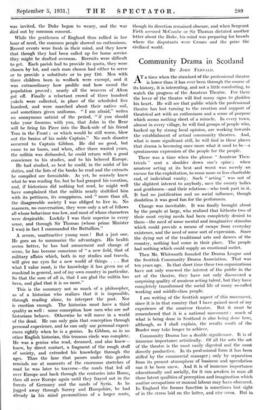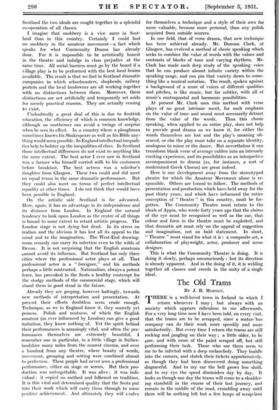Community Drama in Scotland BY JOHN FERNALD.
ATa time when the standard of the professional theatre is lower than it has ever been through the course of its history, it is interesting, and not a little comforting, to watch the progress of the Amateur Theatre. For there the lover of the theatre will find many signs to gladden his heart. He will see that public which the professional theatre has lost turning to the creation and support of theatrical art with an enthusiasm and a sense of purpose which seems nothing short of a miracle. In every town, almost in every village, he will find groups of people who, backed up by strong local opinion, are working towards the establishment of actual community theatres. And, what is more significant still, he will find in these places that drama is becoming once more what it used to be—a spontaneous expression of the people for the people.
There was a time when the phrase " Amateur Thea- tricals " sent a shudder down one's spine ; when amateur acting at its best and worst was merely an excuse for the exploitation, to some more or less charitable end, of individual vanity. Such " acting " was not of the slightest interest to anybody, save the county ladies and gentlemen—and their relations—who took part in it. It had no justification and no social influence, though doubtless it was good fun for the performers.
Change was inevitable. It was finally brought about by the people at large, who realized that hitherto two of their most crying needs had been completely denied to them—the need of some mental and imaginative stimulus which could provide a means of escape from everyday existence, and the need of some sort of expression. Since the dying out of the traditional arts and dances of the country, nothing had come in their place. The people had nothing which could supply an emotional outlet.
Then Mr. Whitworth founded the Drama League and the Scottish Community Drama Association. That was ten years ago. In that short time these two organizations have not only renewed the interest of the public in the art of the theatre, they have not only discovered a surprising quality of amateur acting talent, but they have completely transformed the social life of many so-called working and middle-class people.
I am writing of the Scottish aspect of this movement, since it is in that country that I have gained most of my experience of the amateur theatre. But it must be remembered that it is a national movement : much of what is being done in Scotland is also being done here, although, as I shall explain, the results south of the Border may take longer to achieve.
Community Drama has a double significance. It is of immense importance artistically. Of all the arts the art of the theatre is the most easily digested and the most directly productive. In its professional form it has been stifled by the commercial manager ; only by separation from its present atmosphere of business and speculation can it be born anew. And it is of immense importance educationally and socially, for it can awaken in man all those latent qualities of perception and-imagination which routine occupations or manual labour may have obscured. In England the former function is sometimes lost sight of in the stress laid on the latter, and vice versa, But in Scotland the two ideals are sought together in a splendid co-operation of all classes.
I imagine that snobbery is a vice rarer in Scot; land than in this country. Certainly I could find no snobbery in the amateur movement—a fact which speaks for what Community Drama has already done. For it is impossible to be artistically honest in the theatre and indulge in class prejudice at the same time. All social barriers must go by the board if a village play is to be performed with the best local brains 'available. The result is that we find in Scotland dramatic companies in which schoolmasters, shepherds, railway porters and the local landowner are all working together with no distinctions between them. Moreover, these distinctions are not artificially and temporarily set aside for merely practical reasons. They are actually ceasing to exist.
Undoubtedly a great deal of this is due to Scottish education, the efficiency of which is common knowledge, although no southerner can avoid a twinge of surprise when he sees its effect. In a country where a ploughman sometimes knows his Shakespeare as well as his Bible any- thing would seem possible. In England intellectual inequali- ties help to bolster up the inequalities of class. In Scotland those intellectual differences do not exist to anything like the same extent. The best actor I ever saw in Scotland was a farmer who himself carried milk to his customers before breakfast. The best actress was a solicitor's daughter from Glasgow. These two could and did meet on equal terms in the same dramatic performance. But they could also meet on terms of perfect intellectual equality at other times. I do not think that would have been possible in England.
On the artistic side Scotland is far advanced. Here, again, it has an advantage in its independence and its distance from London. In England the natural tendency to look upon London as the centre of all things is bound to some extent to retard artistic progress. The London stage is not dying but dead. In its stress on realism and the obvious it has lost all its appeal to the mind and to the imagination. The West-End drawing- room comedy can carry its infection even to the wilds of Devon. It is not surprising that the English amateurs cannot avoid its influence. But Scotland has only three cities where the professional actor plays at all. That professional actor is a " foreigner," and his methods perhaps a little mistrusted. Nationalism, always a potent force, has provoked in the Scots a healthy contempt for the stodgy methods of the commercial stage, which will stand them in good stead in the future.
Already they are groping, however haltingly, towards new methods of interpretation and presentation. At present their efforts doubtless seem crude enough. Technique, as we in England know it, they scarcely yet possess. Polish and neatness, of which the English amateur (as ever influenced by London) can give a good imitation, they know nothing of. Yet the spirit behind their performances is amazingly vital, and often the per- formances themselves are extremely beautiful. I remember one in particular, in a little village in Suther- landshire many miles from the nearest cinema, and over a hundred from any theatre, where beauty of words, movement, grouping and setting were combined almost to perfection. These people had never seen a professional performance, either on stage or screen. But their pro- duction was unforgettable. It was alive : it was indi- vidual : it copied no method and followed no tradition. It is this vital and determined quality that the Scots put into their work which will carry them through to some positive achievement. And ultimately they will evolve for themselves a technique and a style of their own far more valuable, because more personal, than any polish acquired from outside sources.
In one field, that of verse drama, that new technique has been achieved already. Mr. Duncan Clark, of Glasgow, has evolved a method of choric speaking which seeks to combine the value of words with the values and contrasts of blocks of 'tone and varying rhythms. Mr.
Clark has made such deep study of the speaking voice that he can produce almost infinite variety within the speaking range, and can pin that variety down to some- thing like a musical notation. The result, spoken against a background of a score of voices of different qualities and pitches, is like music, but far subtler, with all of music's contrapuntal and harmonic possibilities.
At present Mr. Clark uses this method with verse plays of no great intrinsic merit, for such emphasis on the value of tone and sound must necessarily detract from the value of the words. Thus this choric speaking, when applied to an entire play, does not help to provide good drama as we know it, for either the words themselves are lost and the play's meaning ob- scured, or else the play must take on a separate identity, analogous to mime or the dance. - But nevertheless it can transform blank verse of average calibre into an, intensely exciting experience, and its possibilities as an interpretive accompaniment to drama (as, for instance, a sort of modernized Greek Chorus) are great indeed.
Here is one development away from the stereotyped theatre for which the Amateur Movement alone• is re- sponsible. Others are bound to follow. The methods of presentation and production which have held sway for the past thirty years, and which have influenced the entire conception of " theatre "- in this country, must be for- gotten. The Community Theatre must return to the ideals of Appia, who wrote forty years ago that the claims of the eye must be recognized as well as the ear, that colour and form in the theatre must be exploited, and that dramatic art must rely on the appeal of suggestion and imagination, not on bald statement. In short, " Theatre " must stand for what it is : a composite art, a collaboration of playwright, actor, producer and scene designer.
This is what the Community Theatre is doing. It is doing it slowly, perhaps unconsciously : but its direction is already apparent. And in the doing of it, it is welding together all classes and creeds in the unity of a single ideal.































 Previous page
Previous page